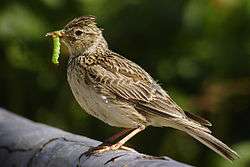alauda
See also: Alauda
Latin

alauda (a skylark)
Etymology
Borrowed from Gaulish *alauda (“skylark”), literally "tuft." Compare Proto-Germanic *laiwarikǭ (“lark”), which could share a Celto-Germanic substratum.
Pronunciation
- (Classical) IPA(key): /aˈlau̯.da/, [aˈɫau̯.da]
Inflection
First declension.
| Case | Singular | Plural |
|---|---|---|
| Nominative | alauda | alaudae |
| Genitive | alaudae | alaudārum |
| Dative | alaudae | alaudīs |
| Accusative | alaudam | alaudās |
| Ablative | alaudā | alaudīs |
| Vocative | alauda | alaudae |
Derived terms
- Alauda
- alaudula
References
- alauda in Charlton T. Lewis and Charles Short (1879) A Latin Dictionary, Oxford: Clarendon Press
- alauda in Charles du Fresne du Cange’s Glossarium Mediæ et Infimæ Latinitatis (augmented edition, 1883–1887)
- alauda in Gaffiot, Félix (1934) Dictionnaire Illustré Latin-Français, Hachette
- alauda in Harry Thurston Peck, editor (1898) Harper's Dictionary of Classical Antiquities, New York: Harper & Brothers
- alauda in William Smith et al., editor (1890) A Dictionary of Greek and Roman Antiquities, London: William Wayte. G. E. Marindin
- Fryske Academy (1998): Lezingen fan it fjirtjinde Frysk Filologekongres: 23, 24 en 25 oktober 1996
- Reichart, L. (2000): Kratylos, Volume 45
This article is issued from
Wiktionary.
The text is licensed under Creative
Commons - Attribution - Sharealike.
Additional terms may apply for the media files.